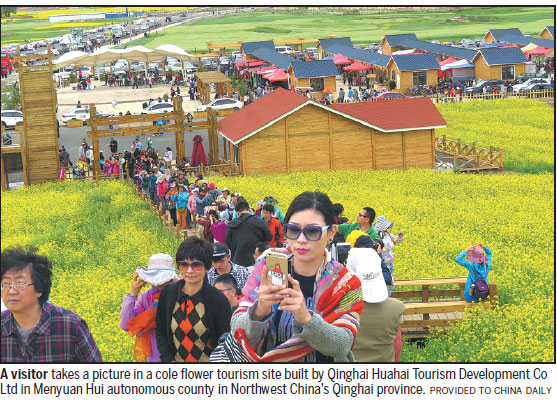A revamp of infrastructure at local flower tourism sites in Menyuan Hui Autonomous County in Northwest China's Qinghai province is helping lift the income of households in the poverty-stricken region.
Founded in 2014, Qinghai Huahai Tourism Development Co Ltd invested 31.1 million yuan ($4.7 million) on improving the overall infrastructure of the cole flower field at Menyuan, a national 4A-level scenic area in Qinghai.
By September 2016, the company had invested a total of 66.3 million yuan on completing the construction of two tourism spots, offering a one-stop experience for sightseeing, catering and entertainment.
At the tourism sites in Menyuan, last year, the company set up 80 stores selling local products to tourists. Each store is managed by one of 80 poverty-stricken local families, generating about 20,000 yuan for each household.
"The recent years have witnessed how much additional income the tourism industry has brought to the local farmers and herdsmen, especially after the launch of the nation's 'aiding-poor tourism' project," said Han Wenlin, president of Qinghai Huahai Tourism Development Co Ltd.
Han said Qinghai is rich in tourism resources, which should be fully utilized.
"We should speed up the development of the sector, building it into a pillar industry, in order to improve people's livelihood in all aspects."
To boost the development of local tourism, Han raised the concept of "systematic planning", in which industries from the top to the bottom should all participate, incentivizing all social forces to get involved in tourism.
"As a result, on the basis of the development of the tourism industry, integrative development in all industries can be achieved, bringing benefits to the whole society," Han said.
Next month marks the second anniversary of the launch of the "10,000 Enterprises Assisting 10,000 Villages" project. Jointly carried out by the government and China Society for Promotion of the Guangcai Program, the project set up one-on-one connections between private enterprises and local poverty-stricken villages.
In three to five years, it aims at recruiting more than 10,000 private companies nationwide to help lift 10,000 poor villages out of poverty.
Guo Feng, director of the Department of Poverty Alleviation and Social Service at the All China Federation of Industry and Commerce, said the"10,000 Enterprises Assisting 10,000 Villages" project has been written into the official documents of the Communist Party of China, attracting the attention of local governments, as well as private enterprise.
"With the launch of the project, one local enterprise can be connected with many poverty villages, and vice versa. In this way, private enterprises can give full play to their advantages of integrating interests, in order to contribute to the nation's targeted poverty alleviation," Guo said.

